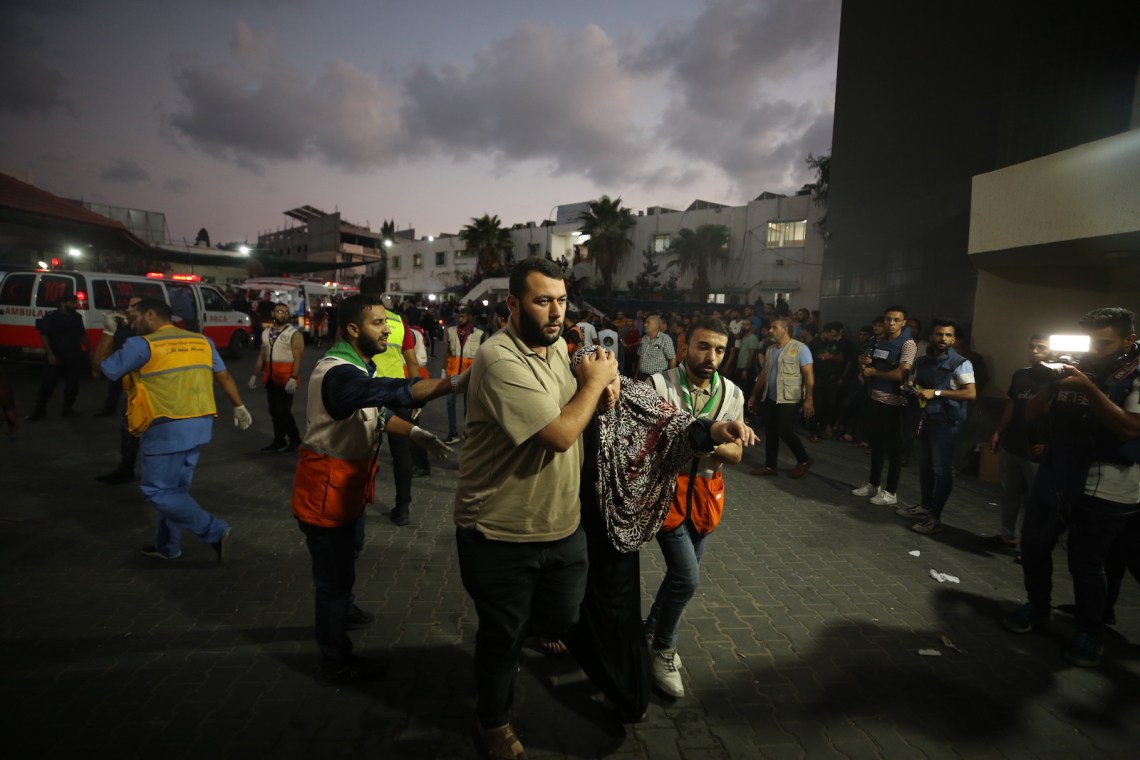This morning the Israeli military ordered more than a million people in northern Gaza to evacuate within twenty-four hours. That’s half the population of the Gaza Strip, an area about the size of Philadelphia. The Gaza Strip is hemmed in on three sides by fences and walls, and the Israeli navy patrols its coast. Its crossings with Israel and Egypt are sealed. There’s nowhere to go, except—for some—to relatives’ overcrowded homes in the southern half of the strip.
The evacuation order came amid a barrage of air strikes that, as of Friday, had killed 1,900 people in Gaza, including at least 583 children, according to the Gaza health ministry. Israel launched the strikes after an unprecedented attack by Hamas-led fighters, who on the morning of October 7 crossed the border into Israel and massacred Israeli civilians, killing hundreds and taking dozens hostage, including children, people with disabilities, and older people. The fighters ambushed young partygoers at an outdoor dance party, reportedly killing 260, shot families inside their homes, and set fire to other homes to force the families out. Since then, armed groups in Gaza have indiscriminately fired thousands of rockets at Israeli cities and towns. Those atrocities amount to war crimes, as does Hamas’s threat to execute some of the Israeli hostages held in Gaza.
But the fact that Hamas-led fighters committed unspeakable war crimes does not give the Israeli military permission to flout its obligations to civilians in Gaza. The evacuation announcement risks mass forced displacement. The evacuation zone that the Israeli military designated today is home to hundreds of thousands of vulnerable people, including children, people with disabilities, older people, and hospital patients. The roads in Gaza are strewn with rubble from destroyed buildings, and fuel is scarce after the Israeli authorities cut supplies of fuel, water, food, and electricity to Gaza in what amounts to a form of collective punishment—itself a war crime.
Civilians in Gaza have not had an opportunity to flee safely. The Gaza health ministry said that seventy people were killed Friday by Israeli air strikes as they fled south via the route that the Israeli military designated. Gaza’s main hospital, Shifa, is in the evacuation zone, so the order also makes it extremely difficult for people to access medical care—not to mention the fact that the hospital is itself impossible to evacuate. A spokesperson for the Gaza health ministry, Doctor Ashraf Al-Qudra, reported that Shifa is running out of fuel for generators, medicine, and other supplies, even as the number of people injured in the air strikes tops seven thousand.
Parties to an armed conflict always have an obligation to protect civilians, even when their opponents fail to do so. That’s because the laws of war, known as international humanitarian law, enshrine basic principles of humanity that are nonnegotiable. The Israeli military should issue warnings to civilians in Gaza in advance of an attack if doing so would actually allow them to leave safely, and for a safer area. But a warning to flee when there’s no safe place to go and no safe way to get there is not an effective warning.
The evacuation order, which the International Committee of the Red Cross has deemed “not compatible with international humanitarian law,” does not give the Israeli military license to harm the civilians who remain. The United Nations has warned that the order will have “devastating consequences” and instead urged the Israeli government to open a humanitarian corridor to supply civilians, including with water. UN Secretary General António Guterres called on Israel to rescind the order, noting the impossibility of so many vulnerable, undersupplied Gaza residents actually evacuating safely. The order makes a mockery of US Secretary of State Antony Blinken’s request that Israel avoid harm to civilians in Gaza.
Israel’s evacuation order hit a particularly raw nerve for the 70 percent of Gaza residents who are already refugees—having fled their homes in what is now Israel in 1948—and their descendants. They have never been allowed back. That refusal of their right to return is one of the root causes of the current violence. It also made this morning’s order feel particularly terrifying. Some of the older people fleeing northern Gaza today remember the homes they fled seventy-five years ago, as the Israeli military then, too, approached their cities, towns, and villages. They remember, also, that they were not allowed to come back.



